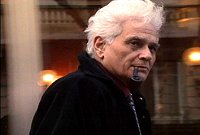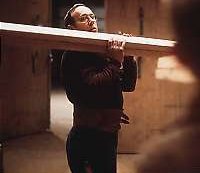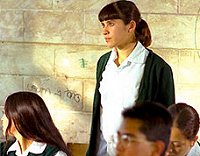 Shadows: Arthouse Films ’03
Shadows: Arthouse Films ’03
SOBIBOR 14 OCT 43 | THE SON | VIOLET PERFUME
< < M O R E | M O R E > >
More mainstream art films have their own pages.
Even more offbeat films are at the SHADOWS FILM FESTIVAL.
last update
20.Jan.03
 DERRIDA
DERRIDA

|
dir Kirby Dick, Amy Ziering Kofman with Jacques Derrida, Marguerite Derrida, Amy Ziering Kofman, Rene Derrida, Eddie Yeghiayan, Avital Ronell, Rene Major, Chantal Major release US 23.Oct.02; UK 31.Jan.03 • 02/US 1h24  REVIEW BY RICH CLINE |
Everything Derrida says is fascinating, whether he's trying to deconstruct the concept of love or explain why he doesn't want to give away any secrets about his love life. He's a magnetic character, likeable and fiercely thoughtful, with all sorts of eccentricities you get the feeling he's trying to hide from us. Even clips of him lecturing at universities or chatting to journalists are captivating. And all of it is beautifully and intriguingly filmed, accompanied by Ryuichi Sakamoto's eerie music. Less effective are Kolman's voiceover readings of his writings, using a virtual monotone that makes following the lightening-quick thoughts rather difficult. And her tone of voice feels patronising, like she's speaking slowly so we'll get it! While some of this still packs a punch (such as Derrida's 1992 essay Circumfession, about his mother's senility), other segments stretch our patience. Then we get a remarkable glimpse of Derrida touring the South African prison where Nelson Mandela was held, followed by an insightful and deeply ironic lecture/discussion about forgiveness at a Cape Town university. These remarkable moments make the film worth looking out for. [themes] 20.Jan.03
 PERSONA
PERSONA

|
dir-scr Ingmar Bergman with Bibi Andersson, Liv Ullmann, Margaretha Krook, Gunnar Bjornstrand, Jorgen Lindstrom reissue UK 31.Jan.03 • 66/Sweden 1h21  REVIEW BY RICH CLINE |
Both performances are astonishing, astutely capturing both the internal struggles and the interpersonal rivalry as the naive nurse opens herself just a bit too much and is savaged by her patient, who never speaks a word. From here it's a battle of wills, as these two characters--essentially two halves of one single woman--merge and separate their identities. Bergman directs this with jarring images and strange trickery, and Sven Nyqvist's black and white cinematography is absolutely stunning. It's haunting and utterly unforgettable. If you try to figure out exactly what this film is about, or what Bergman is trying to say, it might drive you mad. Better to just watch ... and let the feelings and themes wash over you with real power. [adult themes and images] 13.Dec.02
 SOBIBOR, 14 OCTOBER 1943, 4PM [Sobibor, 14 Octobre 1943, 16 Heures]
SOBIBOR, 14 OCTOBER 1943, 4PM [Sobibor, 14 Octobre 1943, 16 Heures]

|
dir-scr Claude Lanzmann with Yehuda Lerner release UK 3.Jan.03 • 01/France 1h35  REVIEW BY RICH CLINE |
And the story is astonishing, so much so that the film actually grips us like a thriller, even though all we see is very dated footage (it's obviously the late-70s!) of a middle-aged man talking and a few now-empty fields. Lerner recounts how he is transported from a PoW camp in Minsk to Soibor in Poland, where his fellow Jewish prisoners realise that they are about to be executed in the gas chambers. They hatch an ingenious and very dangerous plan that hinges on the Germans' obsession with punctuality, and as it progresses it seems so much like a war camp action movie that we have no trouble picturing it vividly in our minds, without any fake Hollywood trickery. The film is just one specific story; it doesn't have the sweep and punch of Shoah. The simple approach is like an old school film, and the familiar material makes it feel like something we surely have seen before. Extended narratives from Lanzmann at the beginning and end are like throwbacks to wartime newsreels. It would help to know French (and Hebrew) in order to get the most out of it. But the material here is priceless, and as an examination of firsthand storytelling, it's also surprisingly gripping. [strong adult themes] 18.Dec.02
 THE SON [Le Fils]
THE SON [Le Fils]

|
dir-scr Jean-Pierre Dardenne, Luc Dardenne with Olivier Gourmet, Morgan Marinne, Isabella Soupart, Fabian Marnette, Remy Renaud, Nassim Hassaini, Kevin Leroy, Felicien Pitsaer, Annette Closset, Jimmy Deloof, Anne Gerard release UK 14.Mar.03 • 02/Belgium 1h43  REVIEW BY RICH CLINE |
While the story has real power, the filmmakers never grab hold of it with their loose-handed and fairly pretentious style--handheld cameras follow the characters so closely that we never get a sense of a scene at all, and the actors are all coaxed to the blandest, most internalised performances you can imagine. We never have a clue what they're feeling or thinking as we watch them wander up corridors and down stairwells, work in their carpentry shop or drive through the countryside. Many scenes have nothing to do with anything! It all feels aimless and improvised, which makes the characters authentic but not very interesting cinema. That said, there's still a very interesting dynamic at the centre of the film in the strained relationship between Olivier and Francis, mostly because Francis hasn't a clue what's going on, and Olivier doesn't seem to know what he's going to do next. There are also moments of brilliance that make you wish the filmmakers had seized hold of things more surely, crafting a proper dramatic story from this material instead of this fascinating yet vaguely amateurish art film. [12 themes, language] 17.Dec.02
 VIOLET PERFUME, NO ONE HEARS YOU [Nadie Te Oye, Perfume de Violetas]
VIOLET PERFUME, NO ONE HEARS YOU [Nadie Te Oye, Perfume de Violetas]

|
dir Maryse Sistach; scr Jose Buil, Maryse Sistach with Ximena Ayala, Nancy Gutierrez, Arcelia Ramirez, Maria Rojo, Luis Fernando Pena, Gabino Rodriguez, Pablo Delgado, Clarissa Malheiros, Soledad Gonzalez release UK 10.Jan.03 • 01/Mexico 1h30  REVIEW BY RICH CLINE |
Director-cowriter Sistach carefully builds the situation, showing how the cards are stacked against Yessica from the beginning. In this macho society, who will believe or even care if she screams that she has been physically assaulted? Her situation continues to close in on her (and on Miriam and her mother as well) until the film takes on the feel of a tragedy. The script is extremely well-written, ringing with truth and essentially important issues. Frustratingly, the direction is rather hammy and unsubtle, which is also the problem with Ayala's Yessica. While the other characters are authentic people we can identify with, Ayala plays Yessica in such a broad way that even before anything happens we wonder what's wrong with her. This askew performance makes it very hard to tap into the film's honesty. Despite the mind-boggling awfulness of her situation, the actress is simply not believable in the role. Still, this is still a vitally important film that deserves attention as it shines an uncomfortable light into one of society's darkest corners. [15 themes, violence, language] 7.Jan.03